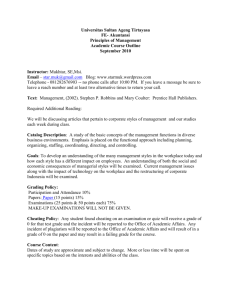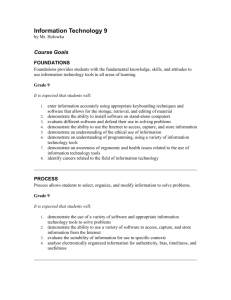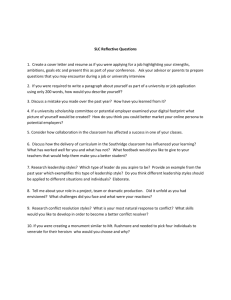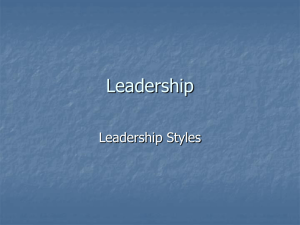FOUNDATIONS FOR EFFECTIVE LEADERSHIP Leadership
advertisement
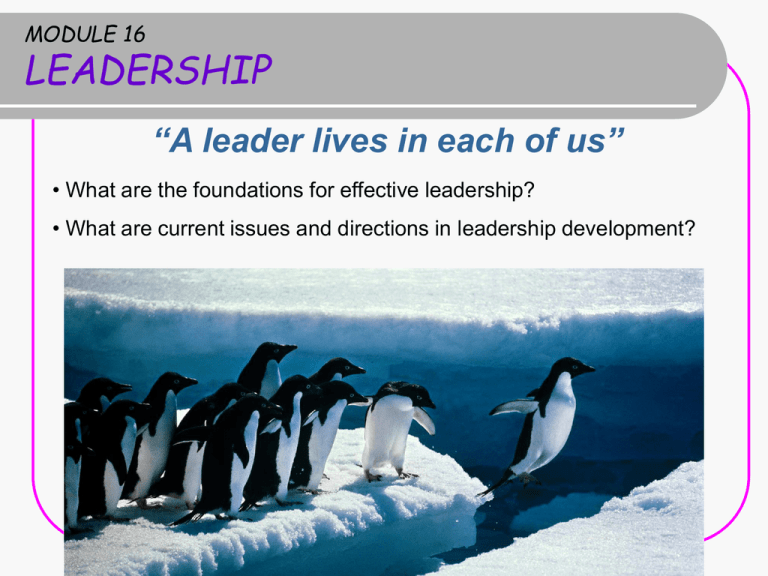
MODULE 16 LEADERSHIP “A leader lives in each of us” • What are the foundations for effective leadership? • What are current issues and directions in leadership development? LEADERSHIP Foundations For Effective Leadership MODULE GUIDE 16.1 Leadership is one of the four functions of management. Leadership relies on use of position power and personal power. Leadership traits and styles can influence leadership effectiveness. Fiedler’s contingency model matches leadership styles with situational differences. House’s path-goal theory matches leadership styles with task and follower characteristics. LEADERSHIP Foundations For Effective Leadership Leadership is one of the four functions of management. LEADERSHIP Foundations For Effective Leadership Power the ability to get others to do what you want them to do Reward Power The capacity to offer something of value as a means of influencing other people Coercive Power The capacity to punish or withhold positive outcomes as a means of influencing other people. Legitimate Power The capacity to influence other people by virtue of formal authority or the rights of office. Expert Power The capacity to influence other people by virtue of specialized knowledge. Referent Power The capacity to influence other people because of their desire to identify personally with you LEADERSHIP Foundations For Effective Leadership Managerial Power = Position Power + Personal Power Power of the POSITION: Based on things managers can offer to others. Rewards: "If you do what I ask, I'll give you a reward." Coercion: "If you don't do what I ask, I'll punish you." Legitimacy: "Because I am the boss; you must do as I ask." Power of the PERSON: Based on how managers are viewed by others. Expertise—as a source of special knowledge and information. Reference—as a person with whom others like to identify. FOUNDATIONS FOR EFFECTIVE LEADERSHIP Leadership Styles Leadership Style The recurring pattern of behaviors exhibited by a leader Autocratic Style Acts in unilateral command and control fashion Human Relation Style Emphasizes people over tasks Democratic Style Encourages participation with an emphasis on both task accomplishments and development of people Lassize-faire Style Is low on both tasks and people FOUNDATIONS FOR EFFECTIVE LEADERSHIP Leadership Styles Traits Often Shared by Effective Leaders Drive Successful leaders have high energy, display initiative, and are tenacious. Self-confidence Successful leaders trust themselves and have confidence in their abilities. Creativity Successful leaders are creative and original in their thinking. Cognitive ability Successful leaders have the intelligence to integrate and interpret information. Business knowledge Successful leaders know their industry and its technical foundations. Motivation Successful leaders enjoy influencing others to achieve shared goals. Flexibility Successful leaders adapt to fit the needs of followers and demands of situations. Honesty and integrity Successful leaders are trustworthy; they are honest, predictable, and dependable. FOUNDATIONS FOR EFFECTIVE LEADERSHIP Leadership Styles Fiedler’s Contingency Theory Suggests that the best leadership style depends on the situation FOUNDATIONS FOR EFFECTIVE LEADERSHIP Leadership Styles Fiedler believes that leadership success requires the right style–situation match. He classifies leadership styles as either task-motivated or relationship motivated, and views them as strongly rooted in our individual personalities. He describes situations according to the leader’s position power, quality of leader–member relations, and amount of task structure. In situations that are most favorable and unfavorable for leaders, his research shows the task-motivated style as a best fit. In more intermediate situations, the relationship-motivated style provides the best fit. FOUNDATIONS FOR EFFECTIVE LEADERSHIP Leadership Styles House’s Path Goal Theory Leaders are most effective when they help followers move along paths through which they can achieve both professional and personal goals House’s Four Path-Goal Leadership Styles 1. “Directive leader” lets others know what is expected; gives directions, maintains standards. 2. “Supportive leader” makes work more pleasant; treats others as equals, acts friendly, shows concern. 3. “Achievement-oriented leader” sets challenging goals; expects high performance, shows confidence. 4. “Participative leader” involves others in decision making; asks for and uses suggestions. LEADERSHIP Trends In Leadership Development MODULE 16.2 • Transformational leadership inspires enthusiasm and extraordinary performance. • Emotionally intelligent leadership handles emotions and relationships well. • Interactive leadership emphasizes communication, listening, and participation. • Moral leadership builds trust from a foundation of personal integrity. • Servant leadership is follower centered and empowering. LEADERSHIP Trends In Leadership Development Leadership surveys of U.S. workers report: • 39% believe leaders most often act in best interest of organization. • 22% see leaders as ready to admit mistakes. • 46% believe their organizations give them freedom to do their jobs. • 25% of women and 16% of men believe their organizations pick the best people for leadership. • 33% of managers are perceived as “strong leaders.” LEADERSHIP Trends In Leadership Development MODULE 16.2 Charismatic Leader develops special leader–follower relationships and inspires followers in extraordinary ways. Transactional Leader directs the efforts of others through tasks, rewards, and structures. Transformational Leader Inspires Enthusiasm and Extraordinary Performance LEADERSHIP Trends In Leadership Development Characteristics of a Transformational Leader Vision Has ideas and a clear sense of direction; communicates them to others; develops excitement about accomplishing shared “dreams.” Charisma Uses power of personal reference and emotion to arouse others’ enthusiasm, faith, loyalty, pride, and trust in themselves. Symbolism Identifies “heroes” and holds spontaneous and planned ceremonies to celebrate excellence and high achievement. Empowerment Helps others grow and develop by removing performance obstacles, sharing responsibilities, and delegating truly challenging work. Intellectual stimulation Gains the involvement of others by creating awareness of problems and stirring their imaginations. Integrity Is honest and credible; acts consistently and out of personal conviction; follows through on commitments. LEADERSHIP Trends In Leadership Development Interactive Leadership is strong on motivating, communicating, listening, and relating positively to others. Emotional Intelligence (EI) is the ability to manage our emotions in social relationships. LEADERSHIP Trends In Leadership Development Peter Drucker – One of the most influential management consultants of the 20th century. Peter Drucker’s “Good Old-Fashioned Leadership” • Good leaders have integrity; they mean what they say, earning and keeping the trust of followers. • Good leaders define and establish a sense of mission; they set goals, priorities and standards. • Good leaders accept leadership as responsibility, not a rank; they surround themselves with talented people. MORE DRUCKER Why Peter Drucker’s leadership advice still matters When Peter Drucker died at the age of 95 in the year 2005, the former CEO of GE, Jack Welch, said: “The world knows he was the greatest management thinker of the last century." That could be an understatement. Drucker was renowned worldwide for his many books, consultancies, newspaper columns, and sage advice on matters of management, organizations, business and society, and executive leadership. Here’s a sampler of his enduring advice: • Management is about human beings. • Don’t ever think or say “I.” Think and say “We.” • Attracting and holding talent have become two of the central tasks of management. • Every decision is risky. • Levels of management should be kept to the minimum. • Effective organizations exist not to satisfy themselves but to fill a customer need. • I’m not going to give you any answers. . . . I’m going to give you the questions you should ask. LEADERSHIP Trends In Leadership Development Moral Leadership Builds trust from a foundation of personal integrity Ethical Leadership Has integrity and appears to others as “good” and “right” by moral standards Integrity In leadership is honesty, credibility and consistency in putting values into action Servant Leadership Means serving others, helping them use their talents to help organizations best serve society Empowerment Gives employees job freedom and power to influence affairs in the organization
